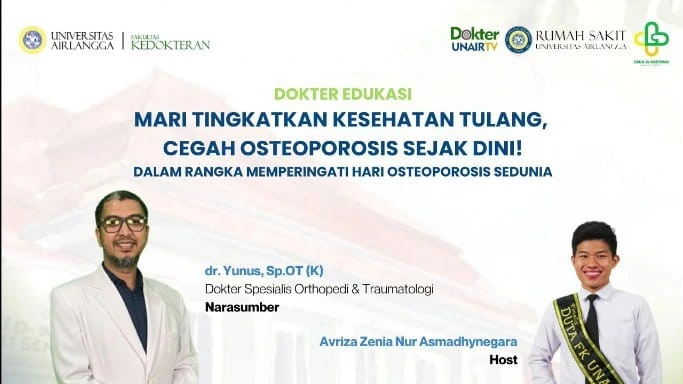UNAIR NEWS – Osteoporosis, a condition marked by the weakening of bones, is most commonly seen in the elderly. To commemorate World Orthopedic and Osteoporosis Day, Universitas Airlangga’s (UNAIR) Faculty of Medicine aired a special segment on Dokter UNAIR TV on Saturday (October 19, 2024), urging the public to prioritize bone health and recognize the early signs of osteoporosis.
Orthopedic and trauma specialist dr. Yunus Sp OT (K) explained that osteoporosis poses a significant risk for individuals who have undergone certain treatments. He pointed out that the disease is degenerative, naturally occurring with age. “Osteoporosis is essentially a result of bones losing their ability to repair and maintain structure as we age,” dr. Yunus stated.
He further explained that bones go through a phase of growth and strengthening during early life. However, as individuals age, bone density begins to decrease. “The weakening of bones, which leads to a reduction in bone mass, is what defines osteoporosis,” the specialist noted.

Risk factors for osteoporosis
Dr. Yunus described osteoporosis as a “silent disease” because it often lacks obvious symptoms. However, the condition can present itself through fractures from falls or persistent bone pain. “This disease can manifest through bone fractures caused by falls or persistent bone pain,” he explained.
He identified two types of osteoporosis: preventable and non-preventable. Non-preventable factors include age, gender, and genetic predisposition. “Factors that cannot be avoided include differences in bone strength based on gender, genetics, and aging,” he explained.
For preventable factors, dr. Yunus emphasized that physical activities during youth, such as cycling and swimming, play a critical role in bone development. He also highlighted the risk of long-term use of steroid-based medications, which can weaken bones. “People who require long-term steroid treatment are at higher risk of developing osteoporosis,” he noted.
Impact of diet on bone health
In maintaining strong bones, dr. Yunus stressed the importance of a nutrient-rich diet, particularly foods high in calcium and vitamin D, which are essential for bone strength. He explained that vitamin D aids in the absorption of calcium, a key component for bone health.
“Calcium and vitamin D are fundamental for bone development, serving as essential building blocks. Vitamin D helps absorb calcium from the intestines, reduces excessive calcium loss through the kidneys, and promotes its incorporation into bones,” dr. Yunus concluded.
Author: Ahmad Hanif Musthafa
Editor : Edwin Fatahuddin









